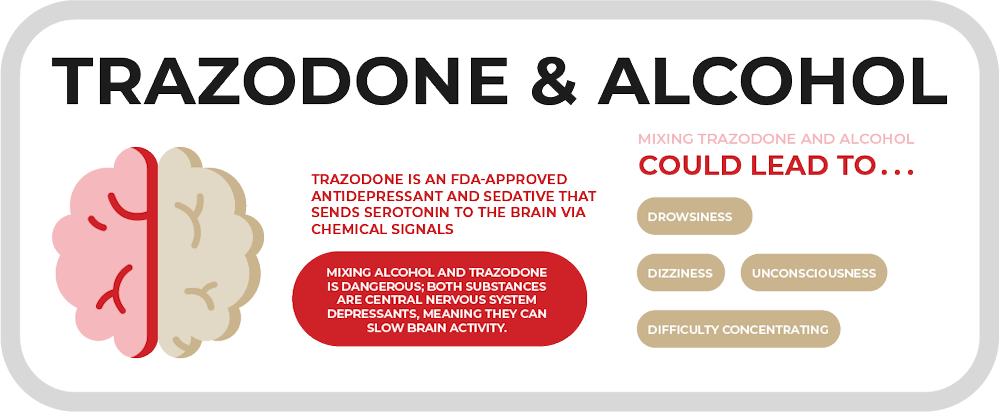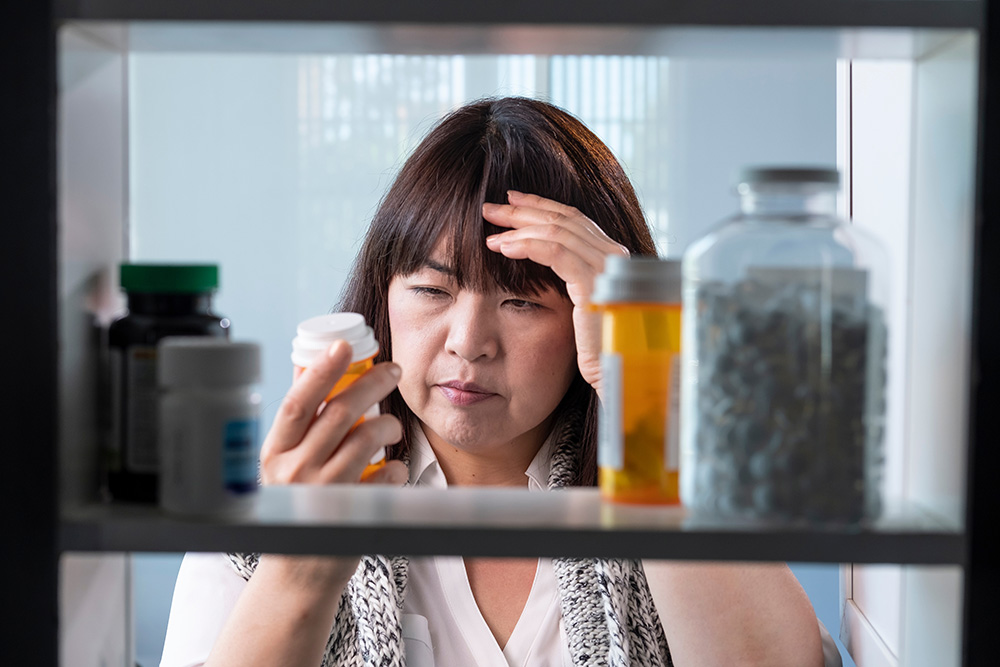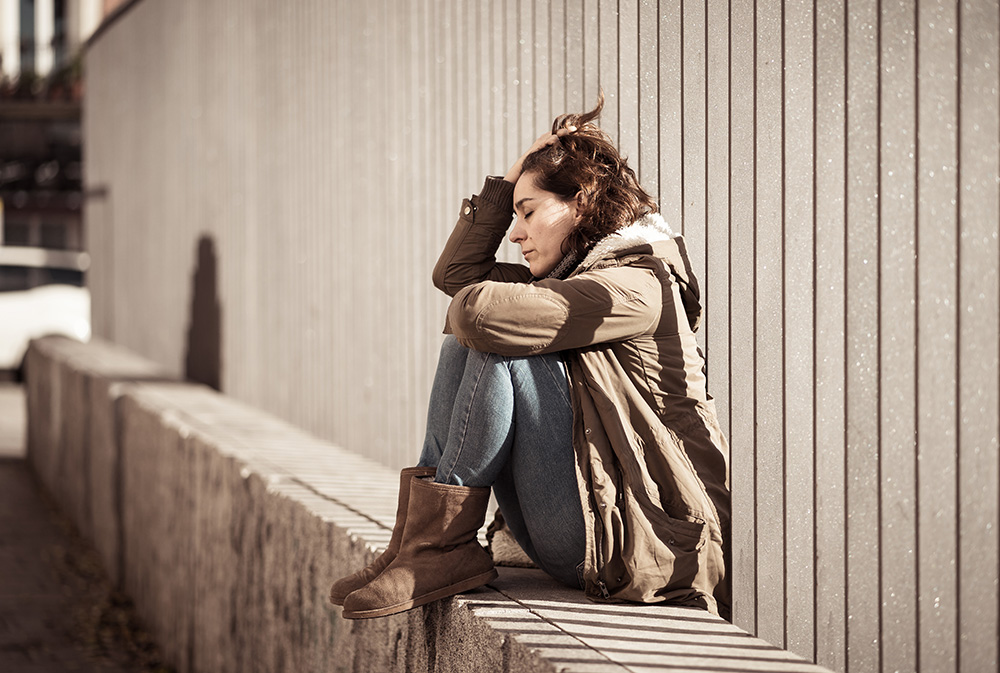Dangers of Mixing Trazodone and Alcohol
Mixing trazodone and alcohol together is pretty risky, as it can intensify one’s intoxication. This could have the potential to also intensify drowsiness and could also result in an overdose. Drowsiness and overdose deaths both come as a result of consuming substances in excess. Using these substances in excess could also lead to addiction.
Table of Contents
ToggleWhat is Trazodone?
Trazodone is an FDA-approved antidepressant and sedative that traits those with depression. However, this medication in particular isn’t used by itself; it’s taken in conjunction with other medication. This is because newer medications do a much better job at treating it. It is worth mentioning, however, that Trazodone is used to combat other conditions that are linked with depression; this is especially true with insomnia because of the drug’s sedative nature.

Why is Trazodone Abused?
Trazodone, like many other substances, has the potential to be abused. When a person abuses any kind of drug or alcohol, chemicals are sent to the pleasure center of the brain; when this happens, the body is rewarded physically and psychologically in an intense manner. Once this happens, a person starts to crave a substance even more than they had before. As time goes on, they start to crave the substance more and more. Eventually, this could lead to dependency, then an addiction.
How Does Trazodone Work?
 Trazodone works by acting on neurotransmitters. When this happens, chemical signals are sent to the brain, allowing serotonin to do its job. Serotonin then builds up between nerves in the brain; this blocks it from entering cells that are closer in proximity. Overall, this helps a person’s mood boost exponentially.
Trazodone works by acting on neurotransmitters. When this happens, chemical signals are sent to the brain, allowing serotonin to do its job. Serotonin then builds up between nerves in the brain; this blocks it from entering cells that are closer in proximity. Overall, this helps a person’s mood boost exponentially.
Most antidepressants combat major depressive disorder by increasing the amount of serotonin produced in the brain. However, it is worth mentioning that more recently the concept of low serotonin levels causing depression has been challenged by professionals. In fact, trazodone is more frequently used for other conditions like insomnia, sleeping disorders, anxiety disorders, and others. It could also be used for substance use disorder and Alzheimers.
It is also worth mentioning that trazodone could have a variety of different side effects. If you are experiencing any of these symptoms, it is imperative to communicate with your physician. These rather uncomfortable side-effects include the following:
- Dry mouth
- Vertigo
- Dizziness
- Impaired coordination
- Confusion
- Exhaustion
- Fatigue
- Drowsiness
- Headaches
- Nausea
- Vomiting
- Constipation
- Suicidal thoughts
- Hallucinations
- Breathing problems
- Heart issues
- Bleeding
- Sudden death
- Drop in sodium levels
- Uncomfortable erections
- Long-lasting erections
- Lack of motor skills
What is Trazodone Abuse?
 Trazodone abuse is when someone takes more trazodone than has been prescribed to them; it is also when trazodone has been mixed with another substance to produce the desired effect. However, when trazodone and other antidepressants are taken responsibly, a person does not feel euphoric effects. That’s not to say that’s impossible with other medications that do not produce intense effects. Some of these would include opioids, benzos, or stimulants.
Trazodone abuse is when someone takes more trazodone than has been prescribed to them; it is also when trazodone has been mixed with another substance to produce the desired effect. However, when trazodone and other antidepressants are taken responsibly, a person does not feel euphoric effects. That’s not to say that’s impossible with other medications that do not produce intense effects. Some of these would include opioids, benzos, or stimulants.
All of that being said, trazodone is not typically a drug that is abused. Not that it’s never abused, it’s just not abused a lot (statistically speaking). There have been studies and reports that have indicated that drug-seeking behavior is rarely ever-present. On the flip side, however, there have been other studies that have been indicative of trazodone abuse.
In 1984, a study was done that found one participant abusing Prozac (used to treat depression and panic attacks) and trazodone in conjunction with each other. In this study, it was documented that the subject was using Prozac as speed and trazodone to relax them (similar to what alcohol may do). It is worth noting that just because it has happened before does not mean it’s a common occurrence.
In addition to all of this, trazodone overdoes happen, although it doesn’t happen a lot. Those who abuse trazodone most often have abused antidepressants before. That being said, those who are taking trazodone for the first time may not become addicted to it unless there is a previous condition.
How Does Alcohol Work?
Alcohol suppresses the central nervous system and causes a person to become drowsy, loud, clumsy, experience a lack of judgment, and decreased motor skills. It does this by attacking excitatory neurotransmitters in the brain. Once that has been done, it suppresses and inhibits other neurotransmitters to give a more sedative effect. In contrast to trazodone, alcohol is one of the most widely abused substances in the world.
What do excitatory neurotransmitters do? Excitatory neurotransmitters bring a bit of a spark to the brain; in other words, they stimulate the mind, while inhibitory neurotransmitters sedate or calm the brain down.
What are the Effects of Alcohol on the Body?
Some of the effects of alcohol on the body include the following:
- Poor reaction time
- Lack of reflexes
- Blurred vision
- Lack of motor skills
- Clumsiness
- Poor coordination
- Lack of judgment
- Fatigue
- Tiredness
- Nausea
- Vomiting
Perhaps the most used (and abused) substance in the United States is alcohol. There have been studies conducted that have indicated that more than 14 million people over the age of 12 suffer from alcohol use disorder.
What is Alcohol Use Disorder?
Alcohol use disorder is when someone cannot control their urge to consume alcohol. Otherwise known as alcoholism, alcohol use disorder is extremely dangerous for those who suffer from it. Those who experience alcoholism oftentimes can’t go a long time without thinking about their next drink. This is true even if they are already drinking something. It’s because of this that alcohol use disorders are one of the more dangerous forms of substance abuse. When a person is suffering from alcoholism, it could be a long road back to stability.
When a person is consuming alcohol, drink after drink, something is happening to their mind from a chemical standpoint. When they drink, the pleasure center of their brain is activated. When this happens, vast amounts of dopamine are released to the brain, causing a feeling that almost everybody who experiences it enjoys. Over time, a person could become dissatisfied and not as stimulated. Because of this, they may need more of the substance to function properly.
When a person starts to become dependent on or addicted to alcohol, they don’t find the pleasure they once did drinking. Instead, they need more of the substance to keep up with their tolerance. Alcohol abuse oftentimes rains on a person’s desires, hopes, and dreams. Those who participate in alcohol abuse typically make their next drink their priority.
Is Mixing Trazodone and Alcohol Dangerous?
 Mixing alcohol and trazodone is dangerous. While a case could be made that the two apart from each other at any given time would do just fine, it is imperative to recognize the destructive potential of the two together. This is because when trazodone and alcohol are mixed/taken together, the effects of alcohol are intensified. This can lead to massive intoxication, overdose, or even death. Not only that, but when someone mixes trazodone and alcohol, they could become very tired very fast. Because of this and alcohol’s effects on the mind, depression and anxiety could worsen as a result of mixing the two substances.
Mixing alcohol and trazodone is dangerous. While a case could be made that the two apart from each other at any given time would do just fine, it is imperative to recognize the destructive potential of the two together. This is because when trazodone and alcohol are mixed/taken together, the effects of alcohol are intensified. This can lead to massive intoxication, overdose, or even death. Not only that, but when someone mixes trazodone and alcohol, they could become very tired very fast. Because of this and alcohol’s effects on the mind, depression and anxiety could worsen as a result of mixing the two substances.
When someone uses these substances for a prolonged period of time, they have the potential to develop a dependency. Once a person becomes dependent on a substance and they either try to come off or spend some time without it, withdrawal could ensue.
What are the Symptoms of Withdrawal?
Some symptoms of withdrawal from trazodone (and alcohol) could include the following:
- Anxiety
- Depression
- Moodiness
- Agitation
- Sleeping trouble
- Nausea
- Vomiting
Withdrawal symptoms are extremely difficult to combat. In situations like these, it is imperative that a person detoxes under the watchful eye of a professional doctor. This could mean the difference between successful treatment and eventual relapse.
Sometimes withdrawal can lead to worse things like acute alcohol withdrawal syndrome. This could produce even more intense withdrawal symptoms such as the following:
- Nausea
- Vomiting
- Vertigo
- Depression
- Anxiety
- Mood swings
- Sweating
- Insomnia
- Chills
- Heart palpitations
- Agitation
- Hallucinations
- Delirium tremors
- Seizures
When someone isn’t seeing a professional for their acute alcohol withdrawal, they could experience a fatal blow. Those who have developed an addiction or dependency on alcohol need to seek professional help from experienced personnel. These exist most often within the walls of a treatment facility, but there are also plenty of areas in which detox is offered. These programs are typically overseen by medical professionals. This is imperative because the individualized aspect of this treatment could make or break a person’s progress.
There’s No Better Time Than the Present – Contact Us Today
Substance use disorder is not an easy road to walk, especially when abusing more than one substance. Trazodone and alcohol abuse is no joke and could lead to a particular level of substance abuse that many have a hard time turning back from. Thankfully, at First City Recovery Center, we treat every patient who walks through our doors like a new person. We haven’t seen everything there is to see. Each person who comes to seek treatment is experiencing something unique, and their treatment should reflect that. If you or a loved one would like to find out more, you can contact us here.

MD, Psychiatrist
Dr. Vahid Osman, MD is a psychiatry specialist in Indianapolis, IN.
Dr. Osman completed a residency at Austin State Hospital. He has over 32 years of experience in Psychiatry & Behavioral Health. He is board certified by the American Board of Psychiatry and Neurology.




